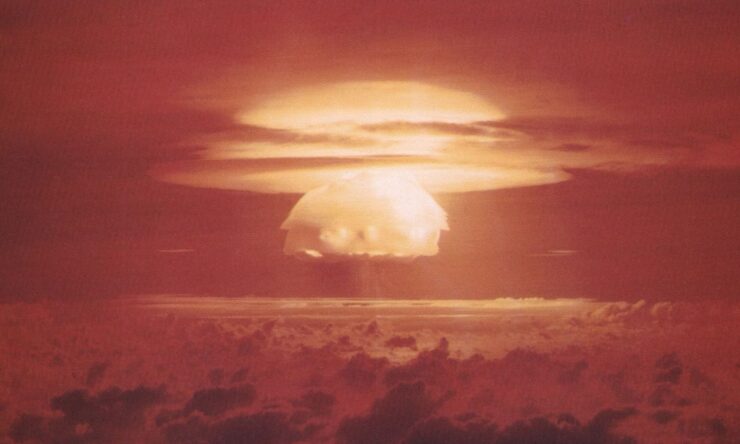Vasili Arkhipov is best known for something he didn’t do, which was to help trigger World War Three on October 27, 1961. Depth-charged by USN forces during the Cuban Missile Crisis, Soviet submarine B-59’s captain Valentin Grigorievitch Savitsky and its political officer Ivan Semonovich Maslennikov believed war had broken out. Accordingly, they proposed nuking the American ships with their nuclear-tipped torpedoes. Use of the weapons required unanimous agreement between the captain, the political officer, and second-in-command Arkhipov. Arkhipov demurred, thus forestalling WWIII.
Many people selfishly prioritize their own survival (or species survival) over the tremendous investments governments have made in nuclear warheads and delivery systems—thus the distressing spectacle of expensive arsenals left unused, even dismantled. No doubt to these people, Arkhipov is a hero. However, while Arkhipov may have been successful in preventing an actual World War Three, he could not prevent fictional nuclear wars. The following five works are but a very small sample of SF’s nuclear war canon.
“Preview of the War We Do Not Want – an Imaginary Account of Russia’s defeat and Occupation 1952-60” by Edward R. Murrow, Arthur Koestler, Philip Wylie, Hal Boyle, Marguerite Higgins, Walter Winchell, and others (1951)
Published ten years to the day before Arkhipov declined to begin WWIII, this Collier’s article depicts a world in which a Soviet vs United Nations conflict becomes grim reality. Soviet invasion of Yugoslavia is met with a UN response. Despite nuclear strikes on Soviet industrial centers, the balance of power appears to favor the Reds. Ultimately, the UN crushes the Soviet regime. Freedom prevails.
Like many nuclear war articles, Preview of the War We Do Not Want is a cautionary tale. However, the point is not to caution the world against nuclear war in general. Rather, the intention is to warn the USSR that their unchecked aggression could only end with the Soviets’ own destruction. The idea that the Soviet Union could be erased from the Earth may appear quaint to modern eyes, but these authors took their thesis quite seriously.
The Offshore Island by Marghanita Laski (1959)
Almost all the people of Britain died during World War Three; the lucky were incinerated immediately and the less fortunate were left to die of fallout. In one sheltered valley, a widow and her children survive. They welcome the appearance of American soldiers as an end to eight years of isolation…until the family discovers the role to which America consigns contaminated survivors.
Laski was prolific in a wide variety of fields, not least of which was writing entries for the OED. SF fans may be interested to know that Laski was the science fiction critic for The Observer. A member of the Campaign for Nuclear Disarmament, she was curiously unenthusiastic about nuclear war despite the obvious entertainment potential.
Nuclear War by Douglas Malewicki (1965)
Nuclear War is a multiplayer game in which players game out a global conflict between nuclear and bioweapon-armed nations. Early stages are non-violent. Later stages involve exuberant exchanges of WMDs in a race to see who can be the first destroy their opponent.
As one might expect, some games leave no survivors. No need to feel sad about the total destruction of life on Earth—simply reshuffle the cards and begin again! Just remember that’s not an option in real life.
The Hole in the Ground, written by Simon Campbell-Jones and directed by David Cobham (1962)
This short film dramatizes a nuclear bomber attack on Great Britain, as seen from the perspective of a United Kingdom Warning and Monitoring Organisation post, 120 feet underground. Their purpose is not to forestall nuclear attack but rather to document it, providing vital information that survivors (civilians, military staff, and senior government officials) will need to prevail in the global conflict to come.
At least some of the staff appear to be civilian volunteers rather than military staff. Nevertheless, all staff carry out their duties with an admirable display of stiff upper lip, from personnel whose home towns have just been incinerated/irradiated to those whose duties include ducking out unprotected onto the surface to check conditions and maintain certain important apparatus.
Still I Persist in Wondering by Edgar Pangborn (1978)
Wondering collects almost all of the short stories from Pangborn’s Darkening World, the same setting as his novels Davy (1964), Judgment of Eve (1966), and The Company of Glory (1975). Davy made it clear that pandemic, climate change, and nuclear war have ended civilization, perhaps forever. These short pieces are a collection of tragedies. They offer different perspectives on the human refusal to learn anything from its self-inflicted calamity.
Pangborn appears to have become increasingly pessimistic about humanity over the course of his short life. These well-crafted, bleak tales were all written shortly before his death in 1976. Approach them with care.
***
I’ve mentioned this subject so often I am not up to linking to every pertinent essay. Nevertheless, I am nowhere near in danger of mining out this narrative seam. Some of you may have favorites not mentioned above. Feel free to mention them in comments. Who knows? Perhaps you know of some I have not yet read, watched, or listened to.
In the words of fanfiction author Musty181, four-time Hugo finalist, prolific book reviewer, and perennial Darwin Award nominee James Davis Nicoll “looks like a default mii with glasses.” His work has appeared in Interzone, Publishers Weekly and Romantic Times as well as on his own websites, James Nicoll Reviews (where he is assisted by editor Karen Lofstrom and web person Adrienne L. Travis) and the 2021, 2022, and 2023 Aurora Award finalist Young People Read Old SFF (where he is assisted by web person Adrienne L. Travis). His Patreon can be found here.










